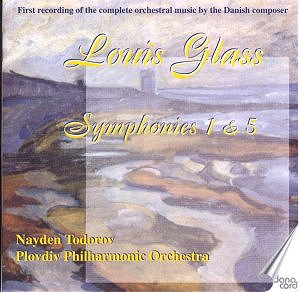With this disc Danacord , with Todorov and the Plovdiv
Orchestra, have recorded the complete symphonies of Louis Glass. The
other discs are CD541 (No. 4), 542
(Nos 3 and 6), CD 453 (Nos 2 and
Fantasia). Each disc has been reviewed on this site.
This release, aside from being the culmination of the
symphony part of the project (I understand that there will be other
Glass orchestral discs), is important because it represents the premiere
recording in any format of the First Symphony and also the arrival of
the third commercial version of the Fifth Symphony.
Strengths and weaknesses are on display in this version
of the Fifth. Todorov takes the Rest and Shadows movements
(II and III) at an idyllic heart-slowing rate. This does not spell boredom.
Todorov and the Bulgarians do this very well but this must be at the
extreme end of the interpretative scale. Any slower and the work would
disintegrate. As it is Todorov probably handles this movement better
than any of the other versions I have heard including the Downes, Segerstam
and Schønwandt off-air versions never mind the Peter Marchbank/SABCSO
(Marco Polo) or the Launy Grøndahl/DRSO on a mono Danacord collection
of four late Romantic Danish symphonies. Where he is less at an advantage
is in the first movement where he really needs more snap and tension.
The reverb in the rich surroundings of the Plovdiv Phil also places
a soft focus accent on the proceedings which works well in the Delian
warmth that sets high summer creeping in the veins but does less justice
in the climactic dynamism of the Daily Work first movement. The
horns which should call out in well defined bell-upended ecstasy at
9.33 (tk 1) can only just be made out. They should register with all
the abandon of the horn choir in Nielsen 5. This takes a little shine
off the recording but my how well Todorov checks, slows and grades the
pace in the slow movement. Imagine what he would make of the slow movement
of Rachmaninov's Second Symphony. In the Nimrod section of Enigma he
might even out-Bernstein Bernstein in his last recording of the Elgar
work. He pulls off a similar success in the Dawn Finale. Glass's
style can best be thought of in terms of Tchaikovsky (a composer also
much echoed in the First Symphony and Violin Concerto of Haakon Børresen),
Elgar (some uncanny echoes) and Delius and his melodic ideas in the
Fifth are of high intrinsic value.
By the way, the title of the Fifth Symphony has nothing
to do with Hitler. It relates to the Indian symbol for renewal and life.
This differs from the Nazi totem in that the 'legs' point in the opposite
direction. This is the same symbol once to be seen on the spines of
the books of Rudyard Kipling.
The First Symphony is the work of a thirty year old
composer writing two years after Nielsen's First Symphony. It opens
casually like an operatic prelude. The exemplars are, on this evidence,
Tchaikovsky, Bruckner and Schubert. The Bruckner echoes are familiar
also from the Third and Fourth Symphonies. Some delicious Tchaikovskian
woodwind work is to be heard in the first movement and even suggesting
a parallel with Glazunov. A grave Anitra-style dance in the andante
sostenuto gives way to a perky Brucknerian scherzo with the brass
dance patterned uncannily like those of the modest Austrian master.
The whole work is neatly if gingerly handled by the Bulgarians.
A unique coupling of two late romantic symphonies which
no lover of the Scandinavian late romantics can afford to be without.
If there are funds on hand I do hope that Jesper Buhl's
Danacord will record the symphonies of Herman Sandby next and who better
than Todorov and the Plovdiv boys and girls to tackle that cycle.
Rob Barnett
If in difficulty by all means contact the UK distributors:
Discovery Records Ltd
discovery.records@virgin.net
phone
01672 563931
fax
01672 563934
or Danacord via their website at www.danacord.dk

![]() Plovdiv PO/Nayden Todorov
Plovdiv PO/Nayden Todorov
![]() DANACORD DACOCD 544
[2 CDs: 85.17]
DANACORD DACOCD 544
[2 CDs: 85.17]